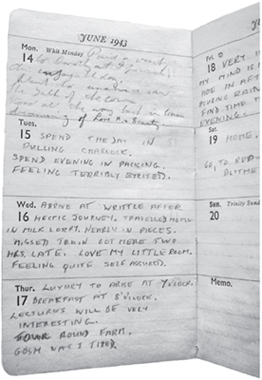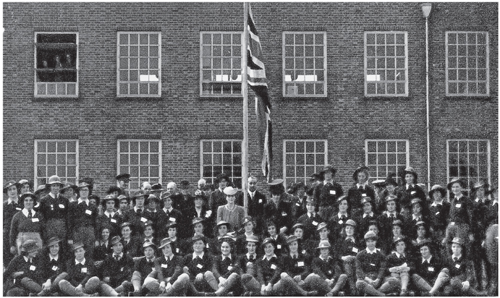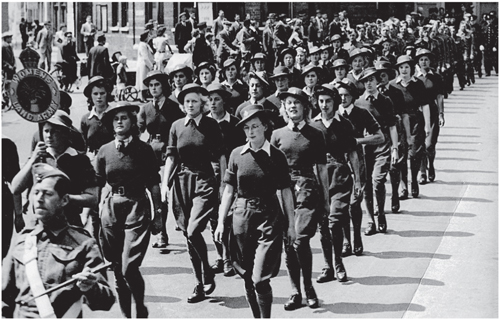Essex Land Girls (19 page)
Authors: Dee Gordon

A good example of the girls’ preoccupation with the opposite sex is to be found in the wartime diaries of Land Girl
Dorothy Jennings
from East London. It is important to bear in mind that these girls were mainly teenagers, so the preoccupation is hardly surprising. There are frequent references to different young men she met on the farms, as well as boys from back home in Stratford, and to dances at Warley Barracks. Here are a few samples:

Extract from Eva Parratt’s 1943 war diary. (Courtesy of Rosemary Pepper; image by author)
17.9.43 | I like Ernie. |
23.12.43 | There was all sorts at Warley Barracks dance. I danced with a Yank. Got on with a sailor, and a soldier brought us a big glass of beer each. |
9.1.44 | Reached hostel at 6.15 and got in through the window. Walked to Thatchers [Thatchers Arms, at Brentwood] later. |
13.1.44 | We taught three soldiers to dance the Palais Glide. |
18.1.44 | Miss Barnett told us off for being out late. |
1.4.44 | Went to pictures and saw Jane Eyre which was lovely. |
15.9.44 | Been thinking about Ron and Reg, don’t know which one I like best. [The diaries suggest Reg, who is mentioned almost daily, until …] |
9.10.44 | So fed up. I wish I could see Ron. I like him so much but I don’t suppose I shall ever see him again. |
When
Rita Hoy
was working in the woodlands around Castle Hedingham, there was a ‘searchlight site nearby, and we were invited out by some of the lads’. In
A History of Mark Hall Manor
, there are accounts of several girls meeting up with troops (American and British) at the Crown in Harlow. One girl mentions that ‘a bunch of boys used always to wait at the station on Sunday nights when we came back from our weekends at home just to walk us back to the Hall’ because, it seems, the long drive had no lighting and ‘was so creepy’.
The hostels, and their young female inhabitants, held quite an attraction for troops from home and overseas. Vera Redshaw reminisced in
All Muck, Now Medals
of a hostel in Rochford, near Southend, where bomber crews ‘from all over the Commonwealth’ would regard the hostel as a second home. They would ‘sit round the slow combustion stoves laughing and talking during the evening, but none of these crews survived and many days were spent in tears as well as laughter, and some days were very difficult to get through’. Similarly, Douglas Savill writes of when the vicarage at Langley, near Saffron Walden, was turned into a Land Army hostel, with the vicar’s wife initially taking on the role of warden. The place suddenly seemed ‘to have a great attraction for the American airmen from the Nuthampstead aerodrome’.
It was not unusual for some of the girls to have pen pals in the forces and develop a long-distance relationship. A meeting might not take place until demobilisation, however.
Although depending on where they lived, quite a few Land Girls working in Essex could get home – especially if home was in Essex or East London – on many weekends, from Saturday afternoon to Sunday evening, though not usually at harvest time. Some went home for practical reasons – like
Babs Newman
, who took her laundry home, and
Doreen Morey
, who needed ‘something decent to eat’. Others met up with family and friends, or, if they were in a more isolated community, for a bit of social life. It was not at all uncommon for the girls to hitch a lift home in this age of innocence, and it was mentioned by numerous ex-WLA members as being a regular occurrence.
One Land Girl at the hostel in Coggeshall (‘Joyce X’ is the only name in the Braintree Museum archive) wrote of several girls hitching a lift one particular Saturday on an open-back lorry carrying old tyres, with soldiers and sailors already on the back when they got on – much to her embarrassment as she had rags in her hair, the forerunner of rollers. When her scarf fell off and the rags fell forward, covering her face, everyone on the lorry had a good laugh, arriving in the East End in a merry mood. (This same group of East Enders would meet up on Sunday evenings at Mile End Road bus depot for the bus journey back, singing rowdy songs all the way.)
Dorothy Jennings
’ diary confirms how run-of-the mill and acceptable hitch-hiking as a form of transport was:
15.1.44 | Hitched to Gallows Corner [Romford] in a car, then to Ilford by lorry, and to the top of the road in a R.A.F. car. |
Her diary points out one of the disadvantages of going home for the weekend if home was London – East London in particular. On 18 June 1944, she mentions ‘gunfire was right overhead’ on a Sunday she spent in Stratford, and makes diverse other references to bomb damage when she was travelling through Leyton and Manor Park.
There were a number of opportunities during the war for members of the WLA to get together, whether it be to celebrate or to compete. ‘Farm Sunday’ was celebrated in style in July 1943. Thousands of Land Girls and farmers took part in processions at fourteen venues around the county, organised by the Essex War Agricultural Executive Committee. At Chelmsford, as reported in the
Essex Newsman
of 10 July, there was a:
… remarkable demonstration of farm machinery from potato lifters and hay rakes to huge combine harvesters and threshers drawn by tractors. It was the best show of agricultural activities that Chelmsford had seen for a long time, and helped to explain how in war time Essex goes on producing record crops … sunburnt Land Girls handled powerful caterpillar tractors with the confidence of experts.
The large numbers of Land Girls in attendance were accorded places of honour in the procession, as were male farm workers. The High Sheriff of Essex, Major Hubert Ashton, MC, DI, accompanied Land Girls in a procession at Ongar led by a parade of agricultural equipment, and the major pointed out that the farmers were ensuring one of the four freedoms outlined in the Atlantic Charter – freedom from want.

Another Land Army Rally, in 1944, at Writtle Agricultural College, with the Duchess of Gloucester in attendance. (Courtesy of the Writtle Archive)
At Burnham-on-Crouch nearly 2,000 people assembled on the playing fields for a service, with Land Girls in evidence, and in Harlow the WLA headed the parade in a ‘farm wagon, decorated with vegetables and cereals’. At Maldon, another 2,000 people watched the procession of ‘Land Army girls and other units’ and at Braintree, ‘a squad of Land Girls’ followed the Colchester ATC Band (
Essex Chronicle
, 9 July 1943). The
Harlow Gazette
reported that the WLA headed their procession with ‘a cart decorated with various vegetables. In between were farm implements drawn by tractors.’
July 1943 was also the fourth birthday of the Land Army, and a party was held at Buckingham Palace on 3 July to which 300 Land Girls from every county in Britain were invited. This party was held indoors as a change from the girls’ usual surroundings. Each girl was presented to the queen along with Princesses Elizabeth and Margaret. Essex representatives were listed in the August 1943 issue of
The Land Girl:
•
D. Hawes (shepherdess)
•
J. Hawes (WAEC leader)
•
E. Beswick (tractor driver)
•
Mrs French (fruit farming)
•
P. Boyce (assistant manageress, Silverpines Poultry Farm)
•
Mrs Davies (in charge of a dairy herd)
•
Miss Baker (warden of the Princess Louise Hostel, one of only two wardens invited)
One of several other parades to include Land Girls was that on Empire Youth Sunday, at Clavering in May 1944.
The Times
printed a photo of the Land Army Girls joining the Home Guard, Army Cadets, Air Training Corps, the National Fire Service and the local church lads’ Brigade Band – with the service in the parish church broadcast on the radio’s
General Forces
programme.
An Essex Rally was held at Dunmow during the same month, with 300 volunteers marching to the local downs, headed by the drums and pipes of the Chelmsford Grammar School Cadet Corps, with a four-year volunteer (Eva King) carrying a new green and gold WLA standard.
The Land Girl
of June 1944 referred to a speech given by Lady Denman, describing the ‘splendid contribution’ made by Essex towards the WLA Benevolent Fund (amounting to £5,000). A silver cup was presented to the Butlers Hostel at Broomfield as winners of the inter-hostel First Aid Challenge, with tea and hymns at ‘Foakes Memorial Hall’ to close the afternoon. This was also the occasion when it was announced that the indomitable Mrs Solly-Flood was standing down as county secretary for family reasons, along with Olive Tritton, the county chairman of the Essex WLA, with successors ‘yet’ to be appointed. (They were replaced, by October, with Mrs Strickland and Mrs Byrne respectively.)

Eva Parratt (fifth from the left, in the far row) as part of the WLA troop at one of the Essex rallies. (Courtesy of Rosemary Pepper)
For the more competitive girls, there was a choice. The WLA at Writtle, for instance, had a cricket team ‘to be reckoned with’ (
Chelmsford Chronicle
,
19 May 1944). The captain was Mrs Jaggar, ‘an excellent fast right hand bowler and a hard hitting bat’. The club was ‘believed to be the first of its kind in the country’ with Mrs Solly-Flood as its president.
Also in June, the Sugar Beet Singling Competition was held at Witham, and won by Miss Diana Moss, aged 29. Diana ‘joined the WLA two years ago after working in the grocery department at Woolworth’s in Stoke Newington, London. Prior to the WLA, she was always getting colds and catarrh which has now gone, and she is hoping for a smallholding after the war.’ (
Chelmsford Chronicle
, 9 June 1944.)
The Maldon Challenge Cup in 1944 was won by Miss J. Davis, who ‘had brought up a pedigree bull’ with ‘Miss D. Danaker taking second prize for her bull and first prize for taking the bull round the show ring’ (
The Land Girl
, October 1944).
The larger hostels had annual ‘anniversary’ parties. Those at Mark Hall, Harlow, the largest hostel in Essex, featured a bonfire and fireworks, with a special cake and illuminations (night lights in painted jam jars). Invited guests were mainly members of the army and the RAF. Similarly, the hostel at Nazeing invited dancing partners for the girls from a neighbouring airfield and the
Chelmsford Chronicle
pointed out that ‘young men looking for the ideal wife noted with appreciation the jam tarts, sausage rolls and cakes which the girls had made’!
Harvest suppers were also held at the larger hostels, with Creeksea Hall described as having ‘a wonderful crooner’ at the 1944 harvest supper and dance, in the October 1944 issue of
The Land Girl
. Some hostels managed funding for concert parties, too.
